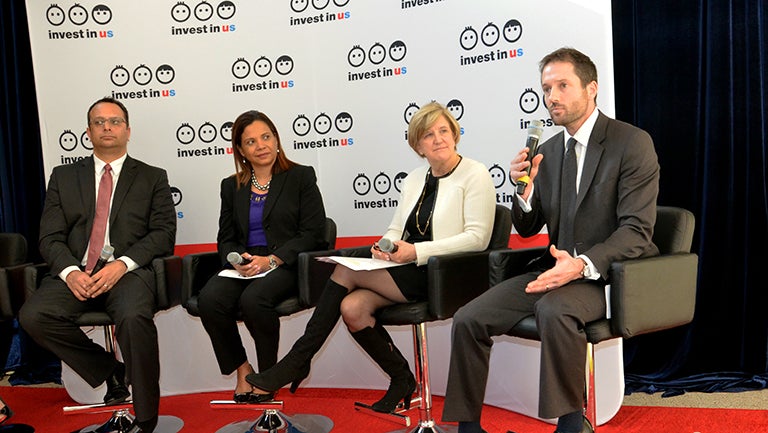Title: White House, Georgetown Announce Early Childhood Innovation Network
A new Early Childhood Innovation Network to be run by the Children’s National Health System with MedStar Georgetown University Hospital and Georgetown University Medical Center (GUMC) was announced yesterday at a White House event.

A new Early Childhood Innovation Network to be run by the Children’s National Health System withMedStar Georgetown University Hospital and Georgetown University Medical Center (GUMC) was announced yesterday at a White House event.
The effort, designed to transform the lives of young children in theDistrict of Columbia, is being established through a$6 million, five-year commitment from The J. Willard and Alice S. Marriott Foundation.
Clinicians and researchers from these institutions will launch the network in 2016.
Working Effectively
Dr. Matthew Biel, chief of adolescent and child psychiatry at MedStar Georgetown University Hospital and associate professor of clinical psychiatry and pediatrics at Georgetown’s School of Medicine, will co-lead the network with Dr. Lee Savio Beers of the Children’s National Health System.
“The impetus behind the Early Childhood Innovation Network is to identify effective, practical, rapidly testable ways to work effectively in schools,” Biel said during the event’s panel discussion, “work effectively in health systems including primary care and work effectively in community-based programs and home-based programs so as to buffer the impact of stress on children and families.”
The event, held at a local elementary school, commemorated the first anniversary of a 2014 White House summit on early childhood education, and included White House officials such as President Obama’s senior advisor Valerie Jarrett as well as early education and foundation leaders.
Invest in US
“Over $330 million in new actions from corporate and philanthropic leaders to expand the reach and enhance the quality of early education for thousands of additional children was announced at that time,” Jarrett said.
Since the December 2014 summit, an initiative called Invest in US has focused on bringing together public and private partners, business leaders, philanthropists, advocates, elected officials and others to support early childhood education.
“Invest in US has continued to press for more children to have this very important access to early education and we’ve been holding webinars and filming PSAs and meeting with stakeholders from all across the country, and we have just done tremendous work,” Jarrett said, “but we want to keep leading and we want to get everyone engaged.”
Commitment to Success
Interested in supporting early childhood, Anne Gunsteens, executive director of the J. Willard and Alice S. Marriott Foundation, attended the 2014 White House summit, where she met experts in the field.
“The commitment that we made last year at Invest in US, I have to be honest, we kind of went into it not really knowing what our plans were,” Gunsteens said. “But I would say this past year, we were quickly able to focus on some areas [in which] we had great interest.”
One such area is the Early Childhood Innovation Network, which is based on the understanding that children will struggle to be successful in school if they are facing stressful situations at home.
Bridging Gaps
“There’s no health without mental health, and in schools, there is no learning without social and emotional health,” Biel said. “And so the efforts to really support schools’ efforts to support the emotional and social development of kids are absolutely critical for creating effective learning environments.”
Schools and health care settings can be oases for children who are experiencing challenging situations at home, he explained.
The Early Childhood Innovation Network will work to bridge the gaps among those oases to improve the health of children and set them up for success in school and in life.
Specific evidence-based interventions will include teaching emotional regulation and self-control to preschool children, training pediatricians to recognize the signs of toxic stress in children and families, working with families to improve parent-child interactions in social service settings and teaching positive parenting skills to parents who have experienced trauma.
“I’m really hopeful that what we’re going to be doing with the Early Childhood Innovation Network is something that will be taken nationwide,” Gunsteens said.